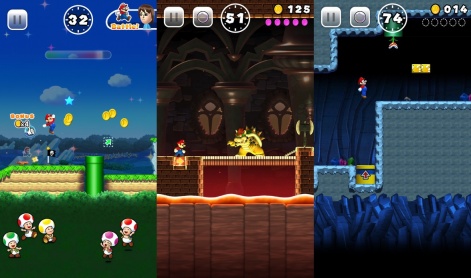Note: Originally published in early September, this piece was a reaction to Shigeru Miyamoto's reveal of Super Mario Run live on stage at an Apple press conference.
It argued that such a high-profile series adopting the premium model in 2016 had the potential to truly disrupt the mobile market and the way players think about premium games.
Now the price has been revealed as $9.99, it's more relevant than ever.
Last night, Apple gave a prime spot on their press conference to a premium game.
The above is a statement with caveats, of course. The nuance of 'free-to-start' vs. true premium is debatable, for starters. And more importantly, this was not just any premium game.
This was the world's best-loved game designer Shigeru Miyamoto, on a stage owned by a another platform holder for the first time ever, announcing a new entry in one of the most iconic gaming franchises of all time and Nintendo's treasured IP.
But Super Mario Run won't be sharing the same model used by any of the App Store's top grossing games.
Instead, it's winding the clock back to a model more closely associated with the platform in its early years, when hits like Angry Birds and Flight Control offered free trial versions alongside the full, paid experiences.
Appetite for disruption
It's a practise that continues today, albeit primarily in the world of indie development - and in a few cases to great success.
But what's the significance of a company the size of Nintendo adopting it, and being given such a big platform on which to do so?
Super Mario Run can become a high-profile ambassador for premium.
Nintendo is a company that relishes (and historically, typically excels at) doing things on its own terms and shaking the industry up.
It came out on top in the previous generation of consoles, getting one over on the PlayStation 3 and the Xbox 360 with a small, white, underpowered box called the Wii and some packed-in sports minigames - the fantastic Wii Sports.
It rained on the parade of the PSP, which analysts were widely tipping to be the next Walkman, with the Nintendo DS - a dual-screen handheld sporting a stylus.
And if rumours are to be believed, it's shaping up to launch a cartridge-based console in 2017. One thing you can't accuse it of is being conservative.
What it's never done, however - at least not without the help of Niantic Labs and the launch of Miitomo - is take this penchant for disruption to another platform.
And on mobile, the impact could be even bigger.
The power of the plumber
Let's start with a safe bet: such is the strength of the Mario brand and Nintendo's fanbase, there will be people who buy Super Mario Run that have never previously spent money on a mobile game.
Being able to effectively guarantee this is a huge deal, and something that few other franchises making their mobile debut could boast.
And it will do well, of course. That much is clear. What's more interesting, however, is the impact it will have on the wider industry.
First off, traditional free-to-play is not going anywhere. Even Mario cannot stem that tide. What Super Mario Run can do, however, is become a high-profile ambassador for premium.
Super Mario Run challenges the false narrative that F2P is the only way to make money on mobile.
Or, if Nintendo really insists, 'free-to-start'.
Suddenly, with Mario on your side, going premium becomes a more attractive option. It challenges the false narrative that F2P is the only way to make money on mobile, and sheds light on a viable alternative.
Gateway game
There's even an argument to suggest that, after paying for Super Mario Run, the psychological leap for consumers to drop money on other premium games becomes significantly smaller.
Although whether that promise can be actualised in a meaningful way is something I'd be hesitant to predict.
Of course, sometimes Nintendo's constant quest for innovation is at its own expense - see Wii U - and there's no guarantee that this won't be one of those examples.
Indeed, there will be plenty of naysayers who take delight in explaining how much more money Nintendo would make if Super Mario Run was going truly free-to-play.

The move could be criticised as an uncharacteristically meek one from Nintendo, an attempt not to rock the boat and upset an army of fans hostile to free-to-play games by offering them what they want - a simple, fun, premium experience.
It could also be seen as Nintendo hedging its bets, with the game also set to launch with a light smattering of IAPs for those who so desire.
But Nintendo knows that this will be a profitable project regardless. People were willing to leave the house for Pokemon, so why not drop a few dollars for Mario?
It seems to me that, for Nintendo, this is about something bigger. This is Nintendo's full debut on another platform, but it's not backing down. It's still doing things on its own terms.
For the mobile games industry, and the place of premium within it, it's hard to think of a more exciting moment.
Find more stories like this on Twitter, Facebook, LinkedIn and our daily newsletter.
















